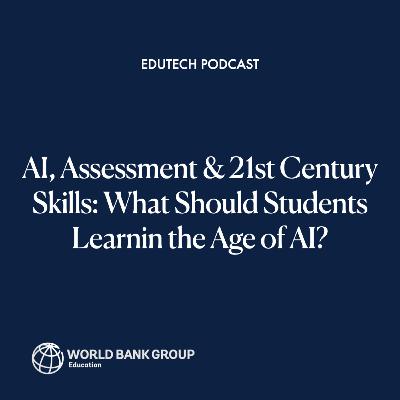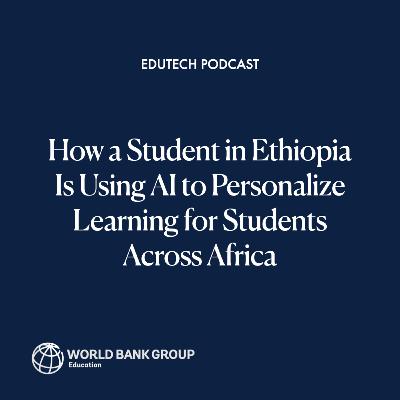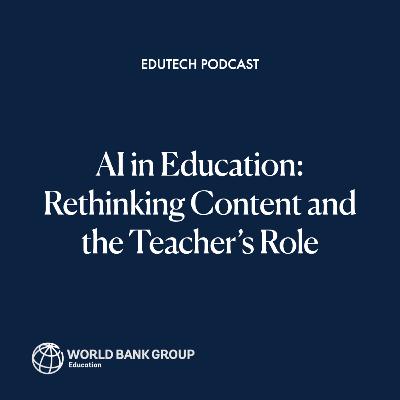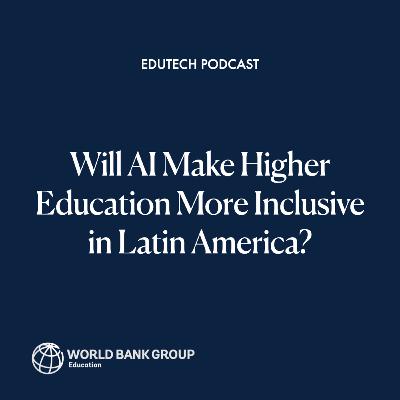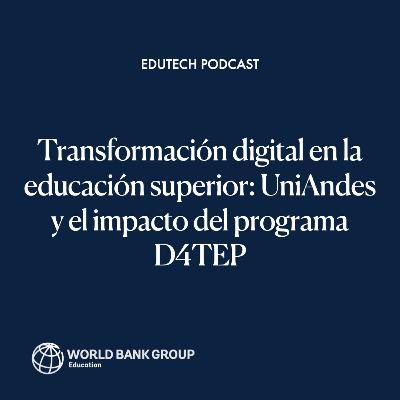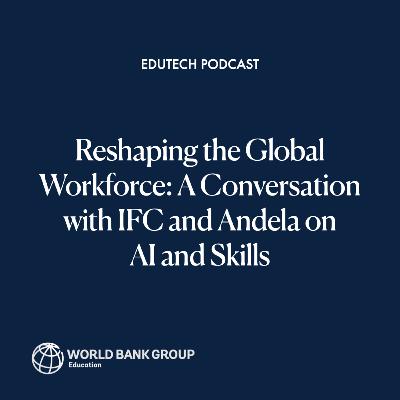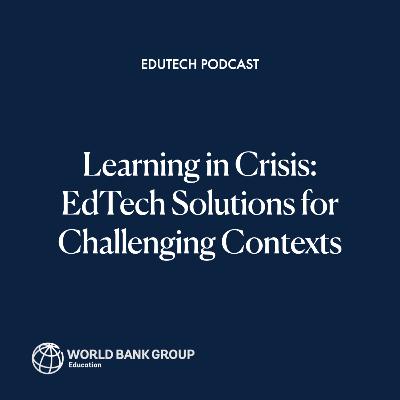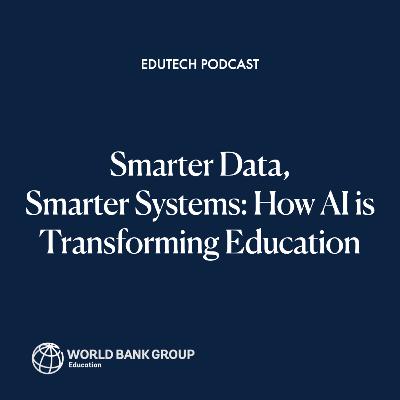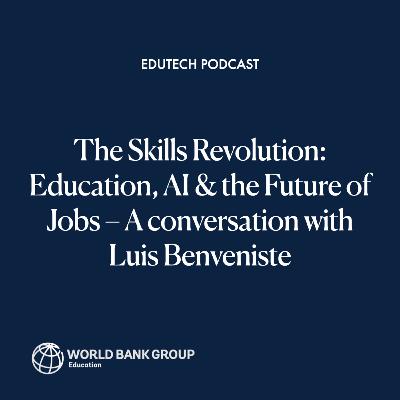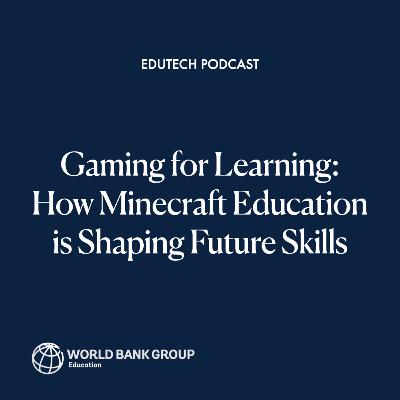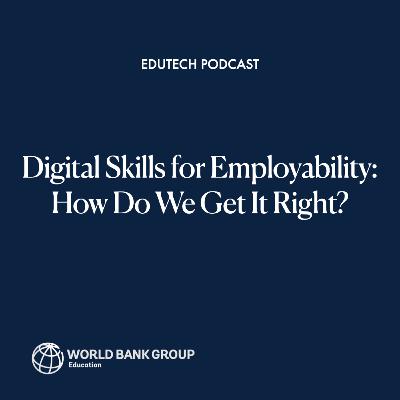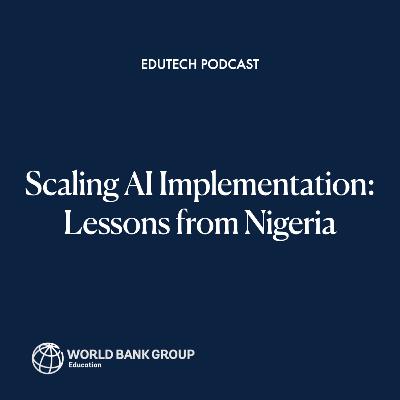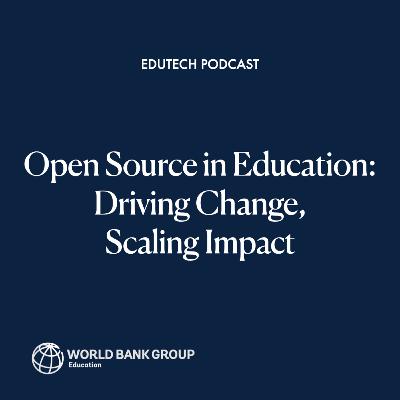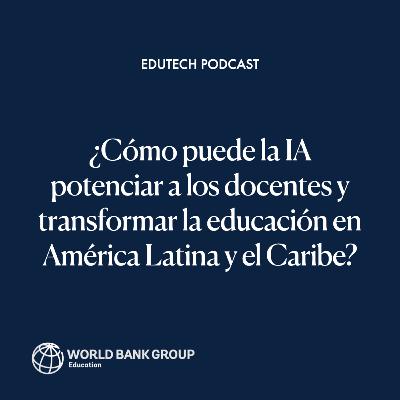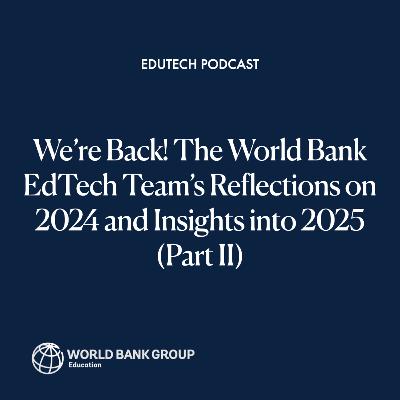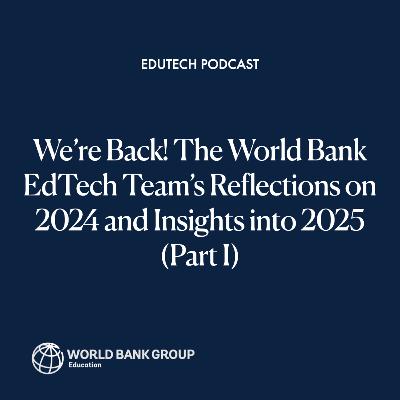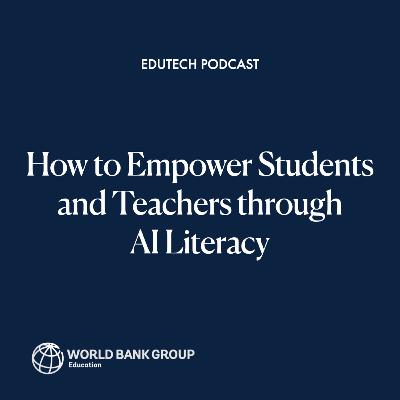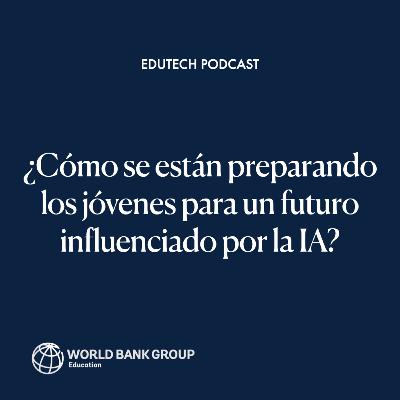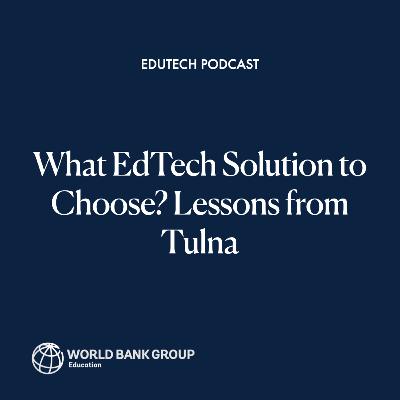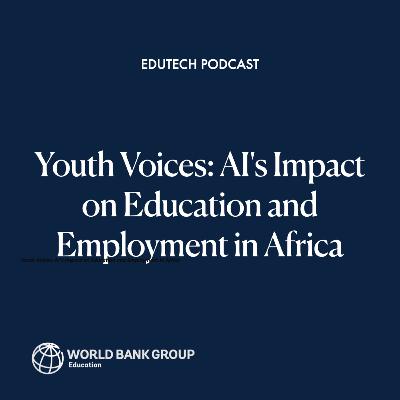Discover World Bank EduTech Podcast
World Bank EduTech Podcast

96 Episodes
Reverse
Today, Bob Hawkins speaks with Nawaz Aslam from the EdTech Hub and Roy Manzi of Manzia AI to explore how artificial intelligence is reshaping what students need to learn and how education systems can assess those skills. Building on themes from the recent AI for Assessment webinar hosted by the EdTech Hub and the World Bank, the discussion highlights the growing importance of 21st century competencies such as critical thinking, problem solving and information literacy as AI becomes part of everyday learning.We also examine emerging approaches to AI-supported assessment, including tools that can generate timely feedback and help teachers measure complex skills at scale. Early pilots, including work in Zimbabwe, offer a glimpse of what responsible AI integration might look like in low resource settings and reinforce why human judgment, clear standards and strong evidence must remain at the center of any education system adopting these technologies.Links:Learn more about the EdTech Hub's AI Observatory and Action LabLearn more about the World Bank’s work on digital and 21st century skills Learn more about Manzia AIA podcast produced by Lucía Blasco.
In this episode, Bob Hawkins speaks with Emanudin Amin, a student at Misrak Polytechnic College in Ethiopia, whose own experience moving through different school systems motivated him to create Mindshift, an AI-powered platform designed to help teachers personalize learning. Emanudin explains how Mindshift uses student data to support teachers, generate lesson plans and assessments, and identify struggling learners before they fall behind. He also shares how teachers at Misrak reacted when they tested the tool, what features they valued most, and what challenges remain as Ethiopia expands its digital infrastructure.The conversation explores the opportunities and risks of bringing AI into classrooms in Ethiopia and across Africa, and reflects on the potential of young innovators on the continent. Bob first met Emanudin during a visit to Misrak under the Ethiopia Education and Skills for Employability (EASE) Project.Links:About EASE (Ethiopia Education and Skills for Employability Project): https://documents.worldbank.org/en/publication/documents-reports/documentdetail/099114202152418991About the Mastercard Foundation: https://mastercardfdn.org/en/Three mindset shifts to build digital and AI empowered education systems: https://blogs.worldbank.org/en/education/three-mindset-shifts-to-build-digital-and-ai-empowered-educationA podcast produced by Lucía Blasco.
Today, we dive into how artificial intelligence is reshaping classrooms and learning experiences around the world. Bob Hawkins, Global Lead for Technology and Innovation in Education at the World Bank, speaks with Joleen Liang, Co-founder of Squirrel AI, Srikanth Talapadi, Managing Director at Chimple, and Daniel Plaut, Innovation Learning Lead at the EdTech Hub. Together they unpack some of the big questions: Can AI-generated content be adapted to local contexts? What role should teachers play when AI takes over parts of instruction? And how can education systems harness these tools to expand equity rather than widen divides?Learn more:About Squirrel AI: https://squirrelai.com/About Chimple: https://chimple.org About the EdTech Hub; https://edtechhub.org/About the World Bank: Education is a key to jobs, growth, and lifelong learningA podcast produced by Lucia Blasco.
In this episode, we explore whether artificial intelligence can truly help close the higher education gap in Latin America and the Caribbean, or if it risks leaving more students behind. Jaime Saavedra, Director for Human Development in Latin America and the Caribbean at the World Bank, speaks with Ezequiel Molina, Senior Economist at the Bank and co-author of a new report on AI Revolution in higher education, and Christopher Neilson, Professor of Economics at Yale University and founder of Tether Education and ConsiliumBots. They discuss real-life innovations that are already reshaping university access in the region—from AI-powered chatbots guiding students through complex admissions processes to tools that detect early signs of dropout risk. The episode also delves into what governments need to do to ensure these technologies promote inclusion rather than deepen existing inequalities.Links:https://www.consiliumbots.comwww.tether.educationReport: AI Revolution in Higher EducationWBG Education in Latin America and the CaribbeanIf you want to learn more about Latin America and the Caribbean, subscribe to our newsletter.A podcast produced by Lucía Blasco.
En este episodio, presentado por Lucía Blasco del equipo de EdTech, conversamos sobre cómo la Universidad de los Andes en Colombia ha logrado avanzar en su proceso de transformación digital. Nos acompañan Leonardo Lima (IFC) y Harold Enrique Castro Barrera, vicerrector de Transformación Digital de UniAndes. Hablamos de los aprendizajes institucionales tras cinco años de implementación del programa D4TEP, apoyado por la Corporación Financiera Internacional (IFC), y de cómo este proceso ha contribuido no solo desde la tecnología, sino también desde la innovación docente, el cambio cultural y el uso estratégico de datos para mejorar los aprendizajes. A nivel global, el programa D4TEP ha mejorado los servicios digitales para 950.000 estudiantes de 25 instituciones de educación superior en 14 países, y ha movilizado 230 millones de dólares en inversiones a través de IFC para apoyar el crecimiento institucional y la digitalización.Más información:IFC – Digital for Tertiary Education Program (D4TEP)Universidad de los Andes (Uniandes), ColombiaUn podcast producido por Lucía Blasco.
In this episode, Carrol Chang, CEO of Andela, and Juliana Ospina, Global EdTech Lead at the International Finance Corporation (IFC), join Bob Hawkins from the World Bank to explore how digital skills and AI are unlocking new job opportunities for youth, especially in Africa. They unpack the rise of demand-driven, scalable training models, the power of global talent marketplaces and the importance of public-private collaboration. From coding in remote villages to the future of work shaped by AI, this conversation looks at how to build more inclusive, connected, and future-ready education systems.Learn more:Andela – Global Talent MarketplaceInternational Finance Corporation (IFC) – Education Open Talent by John Winsor (book)The Worlds I See by Fei-Fei Li (book)World Bank Podcast: Ethiopia’s Education and Skills for Employability (EASE)A podcast produced by Lucia Blasco.
In this episode, World Bank’s Bob Hawkins speaks with three EdTech leaders working to deliver quality education in some of the world’s most challenging environments. Luke Stannard (Can’t Wait to Learn – War Child Alliance), Claire Mongeau (M-Shule), and Kate Radford (EdTech Hub) share how their organisations are using innovation and collaboration to support refugee learners and out-of-school children. The conversation highlights practical lessons on cost-effective scaling, hybrid learning in emergencies, human-centred design, and the power of co-creation with local communities — with insights from Ukraine, East Africa, and beyond.Learn more:Can’t Wait to Learn: Can’t Wait to Learn M-Shule: M-ShuleEdTech Hub: EdTech HubDigital Pathways for Education: reportRefugee education: Financing what matters: blogA podcast produced by Lucia Blasco.
In today’s episode, Robert Fogel, Global Education Architect at Microsoft, joins Bob Hawkins from the World Bank EdTech Team to discuss how Artificial Intelligence can help education systems make smarter use of data to improve learning. They explore how AI-powered Education Management Information Systems (EMIS) can strengthen decision-making, support better planning, and drive stronger outcomes for students. The conversation also highlights the opportunities and challenges of integrating AI responsibly, drawing from real-world experiences across countries — and Microsoft's approach to building ethical, effective solutions in education.Learn more:Microsoft AI PrinciplesResponsible AI Resources – MicrosoftAI for Learning and Education -- CopilotWorld Bank – Education Management Information Systems (EMIS)Artificial Intelligence Revolution in Education: What You Need to KnowA podcast produced by Lucía Blasco.
In today's episode, World Bank Director for Global Education Luis Benveniste joins Bob Hawkins, Ekua Bentil and Alex Twinomugisha, from the EdTeach Team, to talk about how education systems can prepare young people for the future of work. They reflect on the Bank's jobs agenda, the need to invest in both foundational and digital skills, and the role AI could play in transforming education and employment. The conversation includes insights from the Africa Centers of Excellence, lessons from the Digital Skills report and practical examples of how to better align education with labour market needs.LinksThe Africa Higher Education Centers of ExcellenceDigital skills to accelerate human capital for youth in AfricaEmpowering Africa’s youth: Bridging the digital skills gapDigital Pathways for Education: Enabling Greater Impact for AlStanding together for teachersA podcast produced by Lucía Blasco.
In today’s episode, World Bank’s Global Lead for Technology and Innovation in Education, Bob Hawkins, talks with Laylah Bulman, Senior Program Manager at Minecraft Education, about how games are transforming learning. They explore how game mechanics boost engagement, AI’s role in education, and the 21st-century skills students need. Laylah shares insights from her work in Ghana with UNICEF’s Learning Passport and how Minecraft’s Hour of Code fosters computational thinking. They also discuss Lessons in Good Trouble, a game bringing social justice movements to life, and the challenges of integrating game-based learning into classrooms. Plus, what happens when students outsmart their teachers in Minecraft—and why that’s actually a good thing.Learn more: About Minecraft Education: https://education.minecraft.net/en-usYour Future Academy - Ghana and Ukraine- UNICEF Learning Passport and Minecraft Education: https://education.minecraft.net/en-us/blog/your-future-academyAI Foundations: https://education.minecraft.net/en-us/discover/aiAI Adventurers: https://www.youtube.com/playlist?list=PLg9lToc61ftq--rdpIxWg8SCXgBg7jb1aHour of Code: https://education.minecraft.net/en-us/resources/hour-code-2024Reimagining Human Connections: World Bank EdTech Strategy: Five PrinciplesDigital Transformation: World Bank: Digital Skills & Employability A podcast produced by Lucía Blasco.
In today’s episode, World Bank's Global Lead for Technology and Innovation in Education, Bob Hawkins, hosts a fascinating conversation on the intersection of technology, skills, and employability. World Bank’s Guillermo Tovar explores Ethiopia’s Education and Skills for Employability (EASE) project and its innovative use of results-based financing to train and place youth in employment. Rita Fennelly Atkinson, from Digital Promise, shares insights on leveraging micro-credentials and digital badging to recognize skills and enhance employability. Along the way, we tackle key questions like how to measure digital skills, the role of lifelong learning, and—on a lighter note—whether we need an official "results-based financing expert" badge.Links to learn more:Ethiopia’s EASE Project: A Skills RevolutionUnderstanding Micro-Credentials: A GuideResults-Based Financing: Learning from What WorksLearn more about Digital PromiseA podcast produced by Lucía Blasco.
In today's episode, World Bank Senior Economist Juan Baron discusses with Haani Mazari, from the EdTech Hub, and World Bank Education Specialist Martin De Simone, the practical implementation of artificial intelligence in education. The conversation highlights the promising results of a pilot program in Nigeria and explores strategies for scaling AI tools in developing contexts. Key themes include AI as a tutor versus a shortcut, addressing teacher skepticism, and leveraging technology for sustainable education improvements. Along the way, we tackle real-world challenges like connectivity issues, the equity gap, and yes—even an enthusiastic dog making a guest appearance!
Links:
From chalkboards to chatbots: Transforming learning in Nigeria, one prompt at a time
From chalkboards to chatbots in Nigeria: 7 lessons to pioneer generative AI for education
Tipping the scales: AI's dual impact on developing nations
AI revolution in education: what you need to know
Learn more about the EdTech Hub
The EdTech Hub's AI Observatory
A podcast produced by Lucía Blasco.
In this episode of the World Bank EdTech Podcast, we explore how open-source software can expand education access and improve quality. Bob Hawkins moderates a discussion with Bernd Roggendorf (EIDU), Lea Simpson (EdTech Hub), and Barnabas Sang (Ministry of Education, Kenya).They examine the challenges and opportunities of scaling EdTech, the transformative potential of open-source tools, and strategies for impactful implementation. Key themes include sustainable AI, resilient systems, and data-informed policy approaches.
Relevant links:
Open Source: Why It Matters for EdTech in Low-Income Countries
From Chalkboards to Chatbots: Leveraging AI in Education
Advancing Digital Skills in Africa: Lessons from Kenya
EdTech Hub: Insights on Scaling Education Technology
EIDU’s Open-Source Journey
A podcast produced by Lucía Blasco.
En este episodio especial, en español, Jaime Saavedra, director de Desarrollo Humano para América Latina y el Caribe del Banco Mundial, y Eugenio Severin, experto en innovación educativa y ex asesor del Ministerio de Educación de Chile, reflexionan sobre el potencial de la Inteligencia Artificial para apoyar a los docentes en la región.
Durante la conversación, exploramos las grandes brechas educativas de América Latina y el Caribe y compartimos cómo herramientas innovadoras pueden facilitar la planificación de clases, mejorar la experiencia de aprendizaje y fortalecer el rol de los maestros en las aulas. Además, analizamos los retos para implementar estas soluciones digitales a gran escala y cómo la IA puede convertirse en una aliada clave para construir sistemas educativos más equitativos y efectivos.
Enlaces recomendados:
👉 Descubre nuestro reporte regional sobre las oportunidades que ofrece la Inteligencia Artificial para la educación: Revolución de la inteligencia artificial en la educación, lo que hay que saber
👉 Explora más sobre el uso de Inteligencia Artificial para abordar la crisis de aprendizaje en el siguiente artículo: Educar para el presente y el futuro: utilizar la inteligencia artificial para afrontar la crisis de aprendizajes
👉Conoce UmmIA, una innovadora plataforma diseñada para apoyar a los docentes en América Latina y el Caribe: https://ummia.cl/
Un podcast producido y editado por Lucía Blasco.
In today’s episode, the World Bank EdTech team looks ahead to 2025, exploring key trends for the future. Bob Hawkins, Alex Twinomugisha, Ekua Bentil, and Cristobal Cobo discuss AI’s evolving role in education, the focus on digital skills, and the push for resilient, adaptable systems. They also address the importance of sustainable AI and responsive policies.
Links:
From Chalkboards to Chatbots in Nigeria: 7 Lessons to Pioneer Generative AI for Education: https://blogs.worldbank.org/en/education/From-chalkboards-to-chatbots-in-Nigeria
100 Student Voices on AI and Education: https://blogs.worldbank.org/en/education/100-student-voices-on-ai-and-education
Education and Technology Overview: https://www.worldbank.org/en/topic/edutech
How to Use ChatGPT to Support Teachers: The Good, the Bad, and the Ugly https://blogs.worldbank.org/en/education/how-use-chatgpt-support-teachers-good-bad-and-ugly
New Tertiary Education and Skills Program Prepares Youth and Adults for the Future of Work and Lifelong Learning https://blogs.worldbank.org/en/education/new-tertiary-education-and-skills-program-prepares-youth-and-adults-future-work-and
A podcast produced by Lucía Blasco.
Welcome back to our podcast! In today’s episode, the World Bank EdTech team reflects on the top EdTech trends of 2024. Bob Hawkins, Alex Twinomugisha, Ekua Bentil, and Cristobal Cobo discuss the growth in investment, the impact of generative AI, and the need for better digital infrastructure. They share insights on how these changes are reshaping teachers’ roles and advancing personalized learning.
Links:
From Chalkboards to Chatbots in Nigeria: 7 Lessons to Pioneer Generative AI for Education: https://blogs.worldbank.org/en/education/From-chalkboards-to-chatbots-in-Nigeria
100 Student Voices on AI and Education: https://blogs.worldbank.org/en/education/100-student-voices-on-ai-and-education
Education and Technology Overview: https://www.worldbank.org/en/topic/edutech
How to Use ChatGPT to Support Teachers: The Good, the Bad, and the Ugly https://blogs.worldbank.org/en/education/how-use-chatgpt-support-teachers-good-bad-and-ugly
New Tertiary Education and Skills Program Prepares Youth and Adults for the Future of Work and Lifelong Learning https://blogs.worldbank.org/en/education/new-tertiary-education-and-skills-program-prepares-youth-and-adults-future-work-and
A podcast produced by Lucía Blasco.
In today's episode, we explore the concept of AI literacy to understand what it means and how it can help students and teachers in navigating the disruptions that AI will likely pose to education systems.
Maria Barron, Education Technology Specialist at the World Bank, speaks with Pati Ruiz, Senior Director of EdTech at Digital Promise, and Jennifer Rubin, Principal Investigator of the Digital Technologies and Education Lab at foundry10.
foundry 10:
Digital Technologies and Education Lab: https://www.foundry10.org/digital-technologies-and-education-lab
Thoughtful and Ethical Approaches to Using AI in Schools: https://www.foundry10.org/stories/thoughtful-and-ethical-approaches-to-using-ai-in-schools
Student Perceptions of AI: Use, Trust, and Literacy: https://www.foundry10.org/stories/student-perceptions-of-ai-use-trust-and-literacy
Student Perceptions of AI: Ethics and Policy at School: https://www.foundry10.org/stories/student-perceptions-of-ai-ethics-and-policy-at-school
Student Perceptions of AI: Recommendations for Schools and Teachers: https://www.foundry10.org/stories/student-perceptions-of-ai-recommendations-for-schools-and-teachers
Navigating Ethical AI: A Professional Development Resource for K-12 Educators: https://www.foundry10.org/stories/navigating-ethical-ai-a-professional-development-resource-for-k-12-educators
Digital Promises:
Artificial Intelligence in Education: https://digitalpromise.org/initiative/artificial-intelligence-in-education/
AI Literacy: A Framework to Understand, Evaluate, and Use Emerging Technology - Full Report: https://digitalpromise.dspacedirect.org/items/6d15adcd-5a84-47fa-b6d0-1310154eee02
AI Literacy Framework - Executive Summary: https://digitalpromise.org/wp-content/uploads/2024/06/24cLSR0009-Exec-Summary-AI-Literacy-Framework-Paper_FINAL.pdf
AI Literacy Practices: https://digitalpromise.org/wp-content/uploads/2024/04/24cLSR0009-Infographic-AI-Literacy-Framework-Paper_FINAL.pdf
Strategies to Promote AI Literacy in K-12: https://digitalpromise.org/initiative/artificial-intelligence-in-education/ai-literacy/strategies-to-promote-ai-literacy-in-k-12/
AI and Digital Equity: https://digitalpromise.org/initiative/artificial-intelligence-in-education/ai-and-digital-equity/
A podcast produced by Lucía Blasco.
Bienvenidos al podcast de EdTech del Banco Mundial. En este episodio, continuamos con la serie 'Youth Voices', dedicada a explorar las opiniones de los jóvenes sobre la integración de las nuevas tecnologías en la educación, centrándonos en el uso de la inteligencia artificial dentro y fuera de las aulas.
Hoy contamos con la participación de dos expertos del Banco Mundial en el campo educativo: Cristóbal Cobo, especialista senior del equipo de EdTech, y Juan David Barón, economista senior en la Práctica Global de Educación. Además, nos acompañan dos jóvenes que están aplicando la IA de manera significativa en sus estudios: Yomaira Antonella Arizabal Muñoz, de 18 años, estudiante de Ingeniería de Software con Inteligencia Artificial en el SENATI de Arequipa, Perú, y Diego Mendoza Contreras, de 19 años, estudiante de Ingeniería Mecatrónica en la Universidad Tecnológica de León, México. La conversación está moderada por la periodista Lucía Blasco.
Enlaces:
Inteligencia artificial para promover el progreso en el mundo - Cumbre de la Juventud del Grupo Banco Mundial 2024: https://www.youtube.com/watch?v=DRVBG0HPjcA
Jóvenes liderando la transformación digital - Cumbre de la Juventud del Grupo Banco Mundial 2024: https://www.youtube.com/watch?v=db0XJF13qHE
Más información sobre la Cumbre de la Juventud 2024 del Grupo Banco Mundial: https://envivo.bancomundial.org/es/evento/2024/cumbre-de-la-juventud-grupo-banco-mundial-2024-impulsando-progreso-transformacion-digital
Sobre la herramienta para hacer música con inteligencia artificial mencionada por Cristóbal Cobo en el podcast: https://suno.com/
Un podcast producido por Lucía Blasco.
Welcome to a special episode on how to better choose EdTech solutions. Today, we're discussing the development and use of Tulna, an innovative tool that was created through a partnership between the Educational Technology department at IIT Bombay and the Central Square Foundation (CSF) in India. Tulna provides a framework to help governments choose better EdTech solutions. Join Juan Barón, Senior Economist at the World Bank, and Haani Mazari, Global Country Engagement Lead for Asia at the EdTech Hub, as they engage in conversation with Gouri Gupta, Director of EdTech at the CSF.
Learn more about the Central Square Foundation (CSF): https://www.centralsquarefoundation.org/
Explore EdTech Tulna: https://www.edtechtulna.org/
Visit the EdTech Hub website: https://edtechhub.org/
Discover the collaboration between the World Bank and the EdTech Hub: https://www.worldbank.org/en/topic/edutech/brief/edtech-hub
A podcast produced by Lucía Blasco.
Welcome to a special episode of our new series that puts youth voices front and center. Today, we're discussing Artificial Intelligence (AI) in education and employment from the perspective of students. This conversation is particularly relevant as the World Bank's EdTech team focuses on leveraging technology to improve education, bringing students essential digital skills for the future, especially in light of emerging technologies like AI.
Join Robert Hawkins, Global Lead for Technology and Innovation in Education at the World Bank, as he engages in conversation with Momo Bertrand, Education Specialist at the World Bank, alongside Rahel Gezahegn Mamo from Addis Ababa University, and Damilare Oyedele from the African Leadership University.
Learn more about the World Bank's work to prioritize STEM skills for youth in Africa: https://blogs.worldbank.org/en/education/empowering-africas-future-prioritizing-stem-skills-youth-and-economic-prosperity
Read our Knowledge Pack (KP) on Technology for Literacy: https://documents1.worldbank.org/curated/en/099118104132241674/pdf/P174252041cdd605a0b94c0e783c0bba0ec.pdf
A podcast produced by Lucía Blasco.


